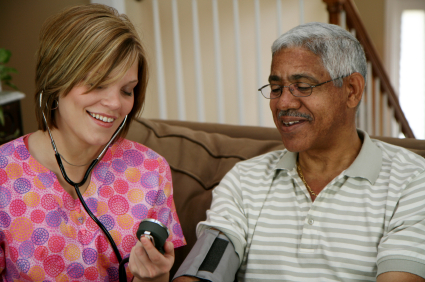Home care is a crucial component of today’s healthcare system. Home care and home nursing provided by in home nurses encompasses a wide range of healthcare and health support services administered within the patient’s home. A skilled, private-duty or in home nurse is necessary anytime that a patient requires care which cannot be safely, effectively or easily provided by family and friends. The goal of home healthcare, home care and home nursing services is to allow individuals to remain in their own homes even during times of medical challenges. Home nursing can help people avoid the use of residential, long-term, or institutional style nursing care facilities.
In home nurses can provide assistance to people recovering from injury and illness, the disabled and those suffering from chronic and terminal illness. Patients in need of medical, nursing, social, and rehabilitation services, as well as those in need of assistance with activities of daily living (ADLs) can benefit from home healthcare. Home care is a general term which applies to all types of health care provided within the patient’s home. Home care agencies provide a variety of services.
 Sometimes there is a distinction made between home care and home health care, however the term home care now popularly refers to both types of care. Non-medical care, provided by caregivers, family members and friends is referred to as home care or custodial care. Caregivers and home health aides offer assistance with life skills such as bathing, dressing, transferring, eating, walking, and using the toilet. These tasks are considered activities of daily life. Other tasks such as housekeeping, cooking, taking medicine, shopping for home essentials, using the phone and managing money are considered instrumental activities of daily living (IADLs.) Individuals who need a caregiver or home health aide to provide assistance with ADLs and IADLs often have mobility issues and may require medical services administered within their homes. Services provided by in home nurses and other licensed medical personnel are defined as home health care. An in home nurse can also provide guidance and assistance to family members, friends and caregivers who are involved in the daily care of the patient.
Sometimes there is a distinction made between home care and home health care, however the term home care now popularly refers to both types of care. Non-medical care, provided by caregivers, family members and friends is referred to as home care or custodial care. Caregivers and home health aides offer assistance with life skills such as bathing, dressing, transferring, eating, walking, and using the toilet. These tasks are considered activities of daily life. Other tasks such as housekeeping, cooking, taking medicine, shopping for home essentials, using the phone and managing money are considered instrumental activities of daily living (IADLs.) Individuals who need a caregiver or home health aide to provide assistance with ADLs and IADLs often have mobility issues and may require medical services administered within their homes. Services provided by in home nurses and other licensed medical personnel are defined as home health care. An in home nurse can also provide guidance and assistance to family members, friends and caregivers who are involved in the daily care of the patient.
Home nursing covers a wide range of medical services to meet the various needs of patients. Examples of services provided by in home nurses include assessment of physical, social, and psychological well-being, acute injury support, wound care, pain management, nutritional guidance, disease education and management, and medication support. Home care agencies typically provide rehabilitation services for those recovering from injury, stroke, surgery, and other medical events. In these instances in home nurses will evaluate the patient, develop a care protocol and coordinate care with other medical professionals such as physical therapists, occupational therapists and speech therapists.
There are other unique instances in which home nursing services may be necessary. In home nurses support mothers during the early postnatal period and provide weight-checks and wellness evaluations on newborn babies. Infants and children with serious medical issues and certain disabilities can benefit from in-home nursing services. Individuals of all ages with serious health conditions, such as paralysis or debilitating diseases can greatly benefit from home nursing services too. In addition to caring for patients, in-home nurses can provide important education to the families of their patients.
Home nursing provided by in home nurses and private duty nurses is an important part of palliative care. This type of care focuses on reducing the pain and symptoms of disease, rather than attempting to cure or halt disease progression. Palliative care differs from hospice care in that its administration is not dependent on prognosis. In addition, palliative care can be provided in conjunction with curative medical treatments.
When patients reach the end-of-life stage, hospice care provided by in home nurses is a wonderful option. This special type of care allows patients to remain at home with their family and friends as they live out their final days. of home nursing focuses on pain relief and symptom control for the patient. In home nurses also provide emotional and psychological support to the patient and their family members and coordinate other services such as those of home health aides, social workers, nutritional specialists and pastoral counselors. Home hospice care allows patients to remain independent and comfortable in their own familiar surroundings. In many cases hospice care administered by in home nurses is less expensive than end-of-life hospitalization.
 In home, skilled, and private duty nurses are frequently responsible for evaluating patient needs, formulating a plan of care, initiating and revising care plans, planning for and providing specialized nursing services, coordinating and implementing preventative and rehabilitative care modalities, and preparing clinical notes to provide physicians and others involved in the patient’s case. Examples of care provided by in home nurses include tracheotomy care, assistance with catheterization, nutritional counseling, guidelines on medication, leg wraps, wound care and dressing changes, diabetic care, colostomy care, IV therapy, blood draws, and supervisory visits.
In home, skilled, and private duty nurses are frequently responsible for evaluating patient needs, formulating a plan of care, initiating and revising care plans, planning for and providing specialized nursing services, coordinating and implementing preventative and rehabilitative care modalities, and preparing clinical notes to provide physicians and others involved in the patient’s case. Examples of care provided by in home nurses include tracheotomy care, assistance with catheterization, nutritional counseling, guidelines on medication, leg wraps, wound care and dressing changes, diabetic care, colostomy care, IV therapy, blood draws, and supervisory visits.
Teaching is often a key component of the home care plan created by nurses providing home care services, in fact there is an expectation that the patient and/or their caregivers will be taught self-care skills over the course of time in which home nursing services are provided. Home nursing services will also cover patients who require intravenous and intramuscular injections, patients who require Foley catheter insertions and patients who require teaching related to illness or injury until such time that they can provide self-care, or until family members or home health aides can safely and competently provide required medical type care. In home nurses also provide community referrals to help patients and families.
Home nursing and home care services are not “one size fits all.” Every patient is unique and a home care agency can help create a plan of care tailored to individual medical, social and psychological needs.

